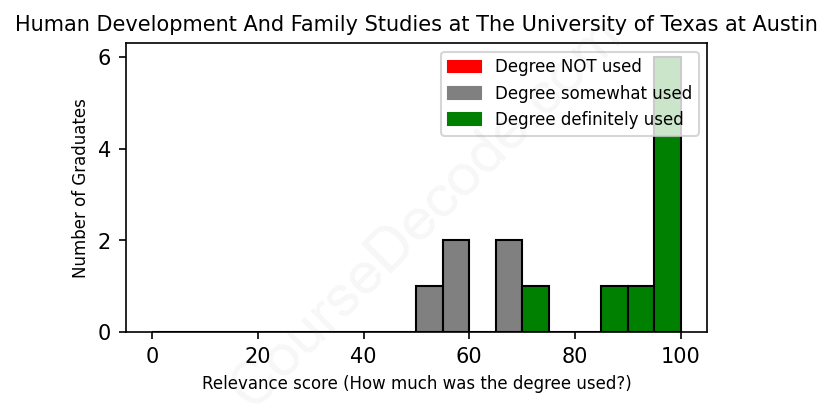
First, some facts. Of the Human Development And Family Studies graduates from The University of Texas at Austin we've analyzed , here's how many have used (or NOT used) their degree in their career:

These are estimates based on AI analysis of 14 LinkedIn profiles (see below).
The verdict? Significantly above average. Overall, with an average relevance score of 81%, Human Development And Family Studies graduates from The University of Texas at Austin have a much higher likelihood (+14%) of finding work in this field compared to the average graduate across all fields:
And for comparison, here's the chart for all profiles we've looked at across all degrees.
Also, after graduating, only 21% of these graduates have pursued further education other than another Bachelor's degree (such as a Masters degree or other), compared to the average across all profiles of 35%. This suggests a Bachelors degree is enough for most Human Development And Family Studies graduates, and it's normal to look for work straight after graduation.
See the details:
|
Relevance score: 59% We think this person has gone into a career only somewhat relevant to their degree. We think this person has gone into a career only somewhat relevant to their degree.
DEGREE INFOGraduated in 2021 from The University of Texas at Austin with a Bachelor of Science - BS in Human Development And Family Studies. No other secondary education since. JOB HISTORY SINCE GRADUATIONSocial Media Intern Resilient Georgia Jan 2021 - May 2021 Communications and Special Projects Analyst  Resilient Georgia May 2021 - Dec 2021 Clinical Research Coordinator  Baylor College of Medicine Sep 2021 - Jun 2023 Communications and Special Projects Analyst  Resilient Georgia Oct 2022 - Apr 2024 Medical Scribe  HOUSTON RETINA ASSOCIATES PA Jul 2023 - May 2024 ABOUTNo information provided. |
The top 10 most common jobs done by the graduates we've analyzed (ranked most common to least) are:
Looking at the job titles that graduates from The University of Texas at Austin with a degree in Human Development and Family Studies have taken on, it’s clear that many of them steer towards roles in education, child development, and healthcare. Common positions like Behavioral Support Assistant, Child Development Specialist, and Teacher highlight a clear connection between their education and their careers. These jobs often rely on understanding human behavior, developmental theories, and family dynamics, which are central to the studies in Human Development and Family Studies. So, if you're considering this degree and have an interest in working with kids or families, it seems like this path leads to some meaningful work!
However, not every job on the list aligns perfectly with the field. Many graduates found themselves in roles like Administrative Assistant or Event Coordinator, which didn’t tap into their specialized education directly. While some skills from Human Development and Family Studies can be beneficial in almost any role that involves interacting with people, a significant portion of these jobs seem to drift away from what the degree specifically prepares students for. In short, while there are definitely strong connections to relevant careers, there's also a mix of unrelated jobs that don’t fully utilize the knowledge gained from the degree. So, it's a mixed bag—some folks are really aligning their work with what they've studied, while others end up in jobs that don’t quite measure up. The takeaway? If you pick this degree, it can lead you to impactful work, especially if you focus on the career paths that directly relate to child and family dynamics.
Here is a visual representation of the most common words in job titles for Human Development And Family Studies graduates (this is across all Human Development And Family Studies graduates we've analyzed, not just those who went to The University of Texas at Austin):

People who graduated with a degree in Human Development and Family Studies from The University of Texas at Austin seem to have a pretty diverse range of career paths. Right out of college, many of them start in roles like teaching assistants, behavioral support assistants, or administrative positions. These early jobs often involve working closely with children and families, which aligns well with the focus of their degree. It's clear that a lot of graduates are passionate about education and mental health, with many taking on roles in schools, child development centers, or with non-profit organizations that prioritize community support.
As these graduates gain more experience—5 to 10 years down the line—they seem to transition into more specialized roles. Many continue in the education system or move into clinical and research settings, like becoming behavior analysts, child development specialists, or even opting for roles in health care. While not all graduates stick closely to their original field, a significant number do find successful and fulfilling careers related to human development, showing that the degree opens the door to various impactful professions. However, it's worth noting that some individuals have veered into different areas or taken on jobs that might not be directly relevant to their studies, but that’s quite common in today’s job market where flexibility and varied experiences are increasingly valued.
Getting a Bachelor’s degree in Human Development and Family Studies at The University of Texas at Austin is generally considered to be on the easier side compared to some more rigorous majors, but that doesn’t mean it’s a walk in the park! You’ll find some interesting classes that explore human behavior, family dynamics, and social issues, which can be pretty engaging if you’re into that stuff. The workload is manageable, but you will still need to put in consistent effort, complete assignments, and engage in the material. Overall, if you're passionate about the subject, you might find it rewarding and not too overwhelming—just be prepared to stay organized and keep up with your studies!
Most commonly, in the LinkedIn profiles we've looked at, it takes people 4 years to finish a Bachelor degree in Human Development And Family Studies.
Looking at the career paths of these Human Development and Family Studies grads, it seems like they've had a mix of jobs, with some definitely earning decent money while others might be getting by. For instance, those who moved into roles like Optometrist or Board Certified Behavior Analyst seem to be on a pretty good financial track, as those professions typically pay well. On the flip side, many of the early roles in education and support services often have lower salary ranges, which could mean they're not raking in the big bucks right away. Overall, it looks like some are doing alright financially, particularly those who found their niche in health care or specialized education roles, while others are still building their careers and likely starting in lower-paying positions.
Here is a visual representation of the most common words seen in the "about" section of LinkedIn profiles who have a Bachelor degree in Human Development And Family Studies (this is across all Human Development And Family Studies graduates we've analyzed, not just those who went to The University of Texas at Austin). This may or may not be useful:

Here are all colleges offering a Bachelor degree in Human Development And Family Studies (ordered by the average relevance score of their Human Development And Family Studies graduates, best to worst) where we have analyzed at least 10 of their graduates:
| College | Score | Count |
|---|---|---|
 Oklahoma State University Oklahoma State University
|
91 | 10 |
 University of Wisconsin-Madison University of Wisconsin-Madison
|
84 | 15 |
 University of Wisconsin-Stout University of Wisconsin-Stout
|
83 | 22 |
 The University of Texas at Austin The University of Texas at Austin
|
81 | 14 |
 Virginia Tech Virginia Tech
|
80 | 12 |
 The Ohio State University The Ohio State University
|
77 | 12 |
 Penn State University Penn State University
|
76 | 34 |
 University of California, Davis University of California, Davis
|
76 | 18 |
 Kansas State University Kansas State University
|
75 | 17 |
 University of North Texas University of North Texas
|
74 | 12 |
 University of Illinois at Urbana-Champaign University of Illinois at Urbana-Champaign
|
74 | 12 |
 Brigham Young University Brigham Young University
|
73 | 28 |
 University of Connecticut University of Connecticut
|
72 | 22 |
 Michigan State University Michigan State University
|
71 | 18 |
 Texas Tech University Texas Tech University
|
70 | 26 |
 Colorado State University Colorado State University
|
69 | 41 |
 Bowling Green State University Bowling Green State University
|
69 | 18 |
 University of Rhode Island University of Rhode Island
|
69 | 14 |
 Oregon State University Oregon State University
|
68 | 28 |
 Washington State University Washington State University
|
67 | 16 |
 University of Arizona University of Arizona
|
62 | 13 |
 The University of Alabama The University of Alabama
|
62 | 10 |
 Arizona State University Arizona State University
|
61 | 29 |
 The University of Georgia The University of Georgia
|
61 | 17 |
 University of North Carolina at Greensboro University of North Carolina at Greensboro
|
58 | 14 |
 California State University San Marcos California State University San Marcos
|
49 | 12 |